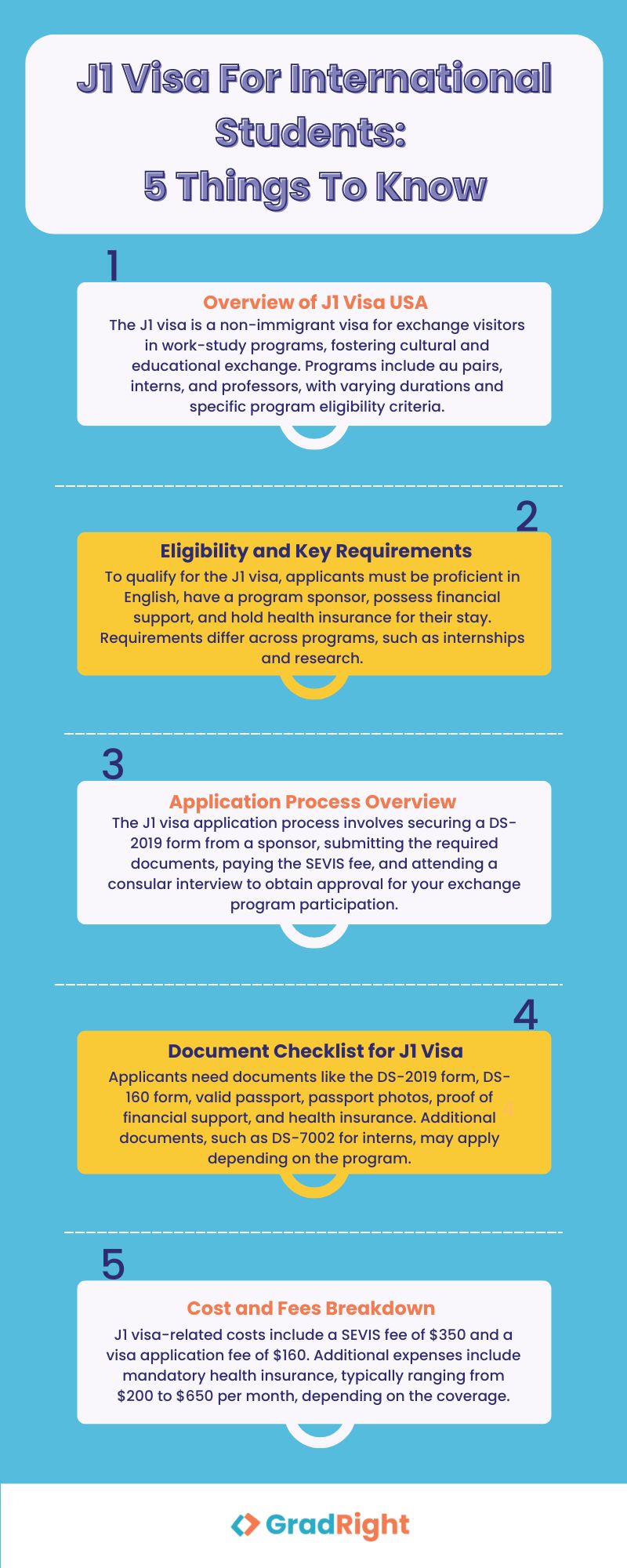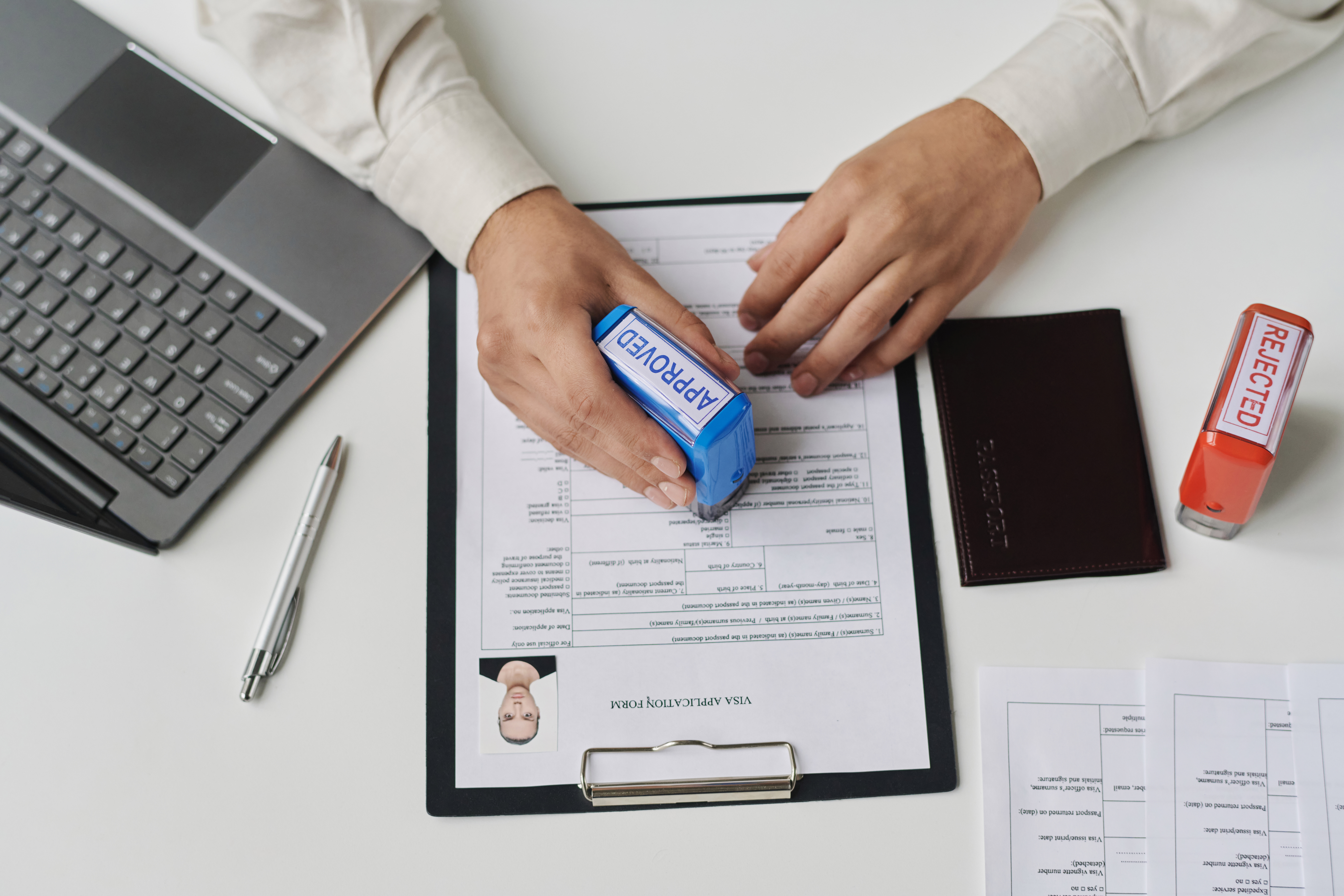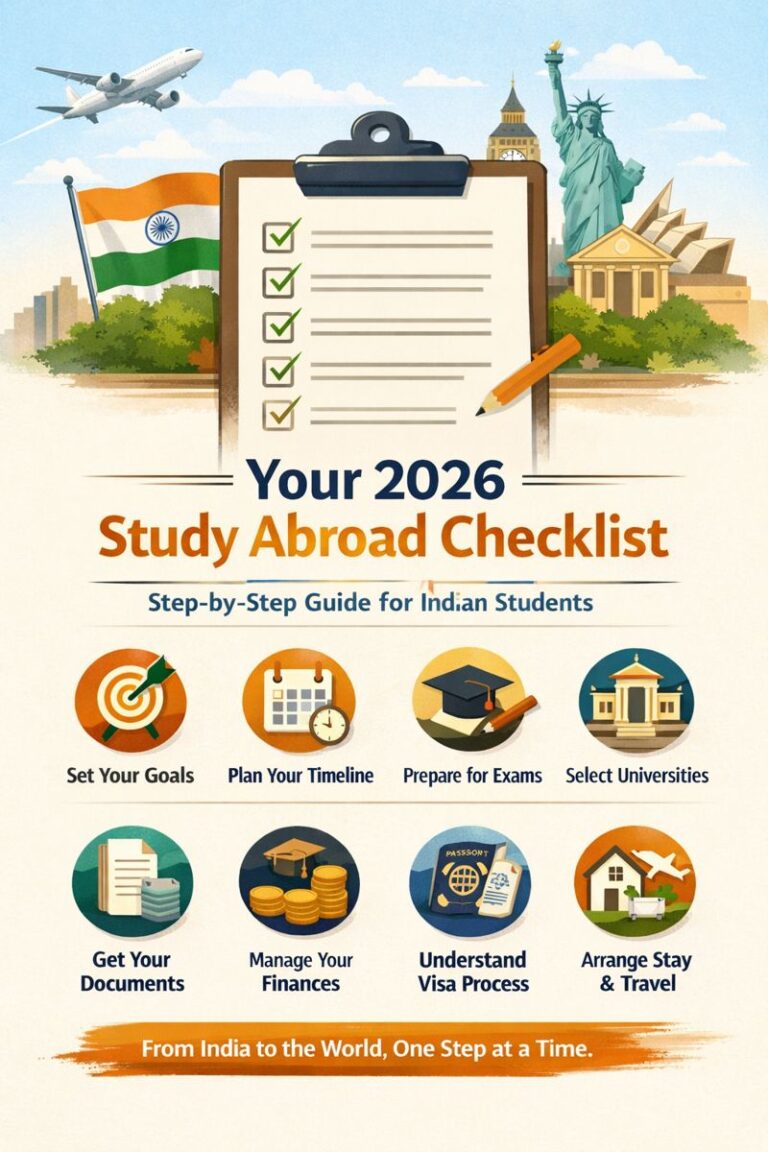The J1 visa in the USA is issued to students or candidates aspiring to go to the US for a work/study-based exchange program.
Here’s what it looks like.
If you are checking up for a J1 visa in the USA or need clarity about a J1 visa USA, this blog covers all the details you might need.

J1 Visa USA Explained
The J1 visa USA or the exchange visitor visa is a non-immigrant visa for foreigners who wish to take part in a work-study-based exchange and visitor program in the US.
To get a J1 visa USA, your desired program must be approved by the Department of State Bureau of Educational and Cultural Affairs.
The J1 visa-holder students are typically sponsored by an educational or nonprofit institution.
The J1 visa as mentioned above is issued to students/candidates participating in exchange programs.
The various programs that are listed for a J1 visa by the US Dept of State and travel are as follows:
- Au Pair
- Camp Counselor
- College and University Student
- Government visitor
- Intern
- International Visitor
- Physician
- Professor
- Research Scholar
- Short-term Scholar
- Specialist
- Summer work travel
- Secondary school student
- STEM Initiatives
So, it is safe to say that if you are enrolled in any of the sponsored courses mentioned above, a flight to the US awaits you.
Speaking of the validity of the J1 visa in the USA, the duration of the visa lasts as long as your exchange program, which might last for 3 months to 3 years.
For example, a degree student could stay in the country for three to four years. Whereas camp counsellors and summer workers could be in the country for about 4 months.
The reason the tenure of a J1 visa USA is emphasized is that one of the primary requirements of obtaining a J1 visa USA for international candidates entails that they move to their home country after the completion of their course or any other exchange program.
Furthermore, J1 visa USA candidates are required to live in their home country or out of the US for at least two years after their return.
On doing so, you will be granted another visa status on your return to the US.
Note: This requirement under immigration law is based on Section 212(e) of the Immigration and Nationality Act.
However, in case of emergencies or special circumstances pertaining to the need of returning to your home country, this requirement may be waived.
To further understand the US J1 visa requirements, let us read the next section.
J1 visa categories
The J1 Visa is designed to foster mutual understanding and cultural exchange between countries. There are 16 different J1 Visa program categories, each with specific requirements. Here’s an overview of those categories:
Camp Counselor
Through this category, a youth worker, post-secondary student, or teacher shares their ideas and culture with the people of the USA. J1 Visa holders under this category work as camp counselors throughout the country. In return, they receive pay and additional benefits.
Here are the common requirements that you must meet under this category:
- You must be at least 18 years of age.
- You must be proficient in English. Speaking the language sufficiently to interact with American youth would also work.
- You must hold specialized skills.
Au Pair
Under this J1 Visa category, the holder lives with a host family in the USA to take part in an intercultural and mutually rewarding opportunity. As a J1 Visa holder, you will be responsible for offering childcare to the host family while continuing your education. In return, you will receive compensation for your work, along with up to $500 to pay for the cost of your academic coursework, boarding, and a room.
This category allows you to live with the host family for 12 months, which can be extended to six, nine, or twelve more months. Here are some more requirements that you must meet under this category:
- You must have received at least 32 hours of childcare training.
- You must complete a minimum of six credit hours or equivalent at an accredited post-secondary educational institution in the USA.
- You must be proficient in the English Language.
- You must be between the ages of 18 and 26 years.
- You must have completed a secondary school level of education or equivalent.
You must be physically capable and pass the background check.
Government Visitor
This program allows distinguished international visitors to strengthen personal and professional relationships with their counterparts in the U.S. local, state, or federal government agencies. The participants train, consult, demonstrate, and observe special skills on various matters.
This program is only open to distinguished and influential people selected by a U.S. local, state, or federal government agency. The candidate must also have engaged in observation discussions, tours, professional meetings, discussions, workshops, and conferences.
College or University Student
Under this category, international students get the opportunity to enroll in UG or graduate degree programs at post-secondary institutions in the USA. They can also participate in an internship program in the U.S. to fulfill their degree program’s objectives in their home country.
As a student under this category, you will be financed by the U.S. government. However, you must meet the following requirements:
- You must be pursuing a non-degree program.
- You must be a full-time student.
- The duration of your non-degree program must not exceed 24 months, including academic training.
Intern
Through this category, students who either graduated within the last 12 months or are currently pursuing a degree program outside the USA receive practical and relevant work experience.
The students must:
- Stay in the U.S. for a maximum of 12 months.
- Participate in an internship that is relevant to their academic program.
- Have a written agreement for their internship with the U.S. employer.
International Visitor
This category is for people who seek to develop professional or personal ties with key American institutions or nationals. The participants must understand the U.S. culture and contribute to a fair exchange of foreign cultures.
The international visitor must:
- Be a potential or recognized leader in a specialized field
- Be nominated by the U.S. Department of State
- Have engaged in research, observation, consultation, or training of special skills.
Physician
This category allows foreign physicians to pursue medical education or training at an institution in the USA. You must meet the following requirements to receive a J1 Visa under this category:
- You must hold a degree in medicine.
- You must be proficient in English.
- Your training program must be recognized by ACGME (Accreditation Council for Graduate Medical Education).
- You must have passed the USMLE (U.S. Medical Licensing Examination).
- You must stay in the U.S. for a maximum of 7 years.
Professor
This category promotes research and the exchange of ideas between a U.S. academic institution and foreign countries. To qualify for this category, the candidate must not be applying for a tenure-track position and must not have participated in a professor program in the last 24 months.
Research Scholar
This category is similar to the previous one. It promotes linkages between academic and research institutions in the USA and foreign countries.
Secondary School Student
This category allows a foreign secondary school student to travel to the U.S. and study at a private or public high school while staying with an American host family. However, the candidate must be between the age of 15 and 18.5 years. They must also not have completed more than 11 years of secondary and primary school education.
Short-term Scholar
This category allows researchers, professors, scholars, and other individuals to come to the U.S. for a short period to participate in lectures, consultations, and observation. The participants must hold specialized knowledge in their field and should stay in the country for six months or less.
Apart from the J1 Visa categories mentioned above, here are five more programs:
- Specialist
- STEM Initiatives
- Summer Work Travel
- Teacher
- Trainee
Also read: A complete guide to the U.S. Student Visa
Importance of J1 Visa
Here’s why a J1 Visa is important:
- It helps promote cultural exchange and mutual understanding between two countries. In 2022 alone, the U.S. hosted more than 300,000 J1 Visa holders across different program categories.
- The J1 Visa gives institutions and businesses an opportunity to include skilled international talent in their research, teaching, training, and similar categories. This provides unparalleled exposure to the participant and contributes to the U.S. economy, creating a win-win situation for both parties involved.
- Through the Physician program under the J1 Visa categories, international physicians receive graduate medical training in the USA. This improves the healthcare outcomes in the country and bridges gaps in global healthcare.
Also read: New F1 Visa rules for the USA
US J1 Visa Requirements: DS-2019 Form, Eligibility, Documents
The foremost US J1 visa requirement is to be admitted into a SEVP-approved institute.
The approved institute or sponsor offers you a DS-2019 form, an essential US J1 visa requirement.
The DS-2019 form or the ‘Certificate of Eligibility for Exchange Visitor Status (J1)’ is the primary document required in the administration of the exchange visitor program.
The DS-2019 form permits an exchange student or visitor to seek an interview at a US embassy or consulate in order to obtain a J1 visa USA to enter the country.
The US J1 visa requirement, the DS-2019 form contains a detailed description of the exchange student’s program including the start date, end date, exchange program details, and other information such as the estimated cost etc.
Therefore, with the help of the DS-2019 form the exchange students and their sponsors are easily identified by the consulate.
In addition to this, keep in mind that the DS-2019 form must remain valid at all times. In case of expiry, a request for a DS-2019 extension must be made prior to its expiration date to avoid any legal mishaps.
Note: It is strictly advised to all exchange students/candidates that allowing the DS-2019 to expire before you complete your academic program violates J-1 status.
US J1 Visa Eligibility and Requirements
As there are a number of programs for which international students require a US J1 visa, the eligibility for each of these programs differs.
Nonetheless, the common eligibility criteria for any international applicant to apply for the US J1 visa are:
- IELTS/TOEFL cleared
- Have experience related to the field of study or work
- Must have completed a degree
- Good academic merit/background
After you satisfy the eligibility, to get your process started for the US J1 visa you also need to have your documents handy.
Documents required for US J1 Visa
As mentioned above, the DS-2019 form is the first document you will need to get the ball running.
The other documents you need to support the DS-2019 form for the US J1 visa are:
- DS-7002 Form for training or internship placement applicants (to be issued by sponsor)
- Form DS-160, online non-immigrant visa application
- A valid passport with a validity of six months after the intended period of stay
- Recent passport photographs
In addition to these, as part of the US J1 visa requirement, applicants/exchange students are required to have health insurance for themselves and anyone who is accompanying them.
The cost of health insurance in the US might cost you approximately about $200-$650/ month.
The Application Process of US J1 Visa
The US J1 visa application is one of the easiest to apply to. The process of applying for your J1 visa USA is quite simple, just follow the steps mentioned below:
Step 1: Issue of the form
The sponsor institute issues the DS-2019 form and Ds-7002 form. To get the form issued quickly, you must work diligently with your sponsors. The information on the DS-2019 forms is completed by the sponsor before handing over to the applicant.
Step 2: Fill up the form
Carefully fill up the J1 visa form, making sure you have entered all the correct information with regards to your course, purpose, personal details, etc.
Step 3: Applying for the J1 visa
While applying for the J1 visa, you will need to pay the SEVIS fee, which costs about $350 (₹28,944.82). It is a mandatory fee for all international students.
The cost of the US J1 visa fee is $160 (₹13,000).
Along with the fees and SEVIS fee, all the necessary documents must be submitted while applying for the J1 visa.
Your application will then be verified by the officials at the consulate during the personal interview.
Step 4: The Interview
The interview at the embassy is the final step. Here, the officer will ask questions with respect to your program of study or work. In addition to that, you must be ready to justify your financial support too.
Make sure that you express your intention of coming back to your home country clearly after your course.
Tip: Schedule the visa interview in advance as the visa processing takes time.
Like any other US visa, the J1 visa also allows dependents such as spouses and children to travel with the J1 visa holder.
But, before we move into the details of the J2 visa, let us quickly look at the expenses you will have to spend on a J1 visa.
How much does it cost to get a J1 visa?
Now that we have covered everything you need to know about the J1 visa in USA, here are all the expenses you will endure in the process:
| Type | Cost | Cost |
| SEVIS Fee | $350 | ₹28,944.82 |
| J1 visa fee | $160 | ₹13,228.32 |
| Health Insurance | $200-$650/month | ₹16,411.65 – ₹53,337.86 |
| Form I-765 filing fee | $ 410 | ₹33,648.93 |
Also read: Study in USA: Process, Requirements, Documents, Visa & Benefits
J1 Visa USA and Employment
J1 visa students are not permitted to work full-time in the US.
International students with a J1 visa can work part-time on-campus/off-campus.
To work part-time, international students need work permits from their respective universities.
Even if J1 visa holders are allowed to work, the high competition makes it difficult for visa holders to find a job.
The J1 visa allows students to work 20 hours a week during the semesters and full-time during vacations.
As a J1 visa holder, you will have to pay taxes on your income.
Further, to work off-campus, international students must seek permission from their exchange program coordinator.
Now that you’ve understood all the particulars of a J1 visa, it should be easy to compile documents and manage your finances for your education as well as all the accompanying expenses.
If you wish to secure your J1 visa finances, FundRight can help you with that.
Opting for any exchange programs listed in the J1 visa category will provide a lifetime of experiential benefits and be truly exposed to an environment like no other.
Frequently Asked Questions
The US J1 visa is a non-immigrant exchange visitor visa for exchange students who are in a learning/working program. Whereas, the M1 visa is issued to students of vocational or non-academic courses in the USA.
The designated sponsors are to issue the form to exchange students/visitors. They are also responsible for assisting you with any queries and doubts.
The J2 visa holder can stay in the US only for the intended duration of the program of the J1 visa holder.
The J1 US visa holder cannot enter the country earlier than 30 days before the program start date. A separate visa has to be applied for if a student wants to enter earlier.
Although the J2 US visa holders are permitted to work in the US, their income cannot be used to support or finance the education of the J1 US visa holder.
The specific requirements for a J1 Visa depend on the category you are applying for. However, the common requirements include the following:
– You must have a program sponsor.
– You must be proficient in English. However, your sufficient and conversational English skills would – also work for categories like Camp Counselor.
– You must have enough funds to support yourself.
– You must have an acceptance letter from an eligible exchange program.
– You must have paid your visa application and SEVIS fee.
– You must have health insurance for the duration of your stay.
The processing time for a J1 Visa may vary for different categories. However, it generally takes six to ten weeks. Factors like your country, documentation, eligibility, funds, and background checks may delay the process.
Yes, you can convert your J1 Visa to a green card using specific pathways. Family sponsorships or employment-based sponsorships (like EB-3 or EB-2) allow you to cover the J1 Visa to a green card. However, the rules may vary based on your home country. For example, some J1 Visa holders must fulfill the two-year residency requirement in their home country.
The validity of your J1 Visa depends on the category of your exchange program. For instance, the J1 Visa under the Physician category is valid for 7 years but only for 12 months for the Intern program. However, some categories allow the provision of extensions if needed.


















